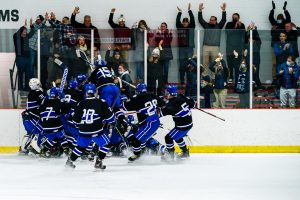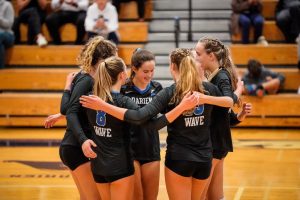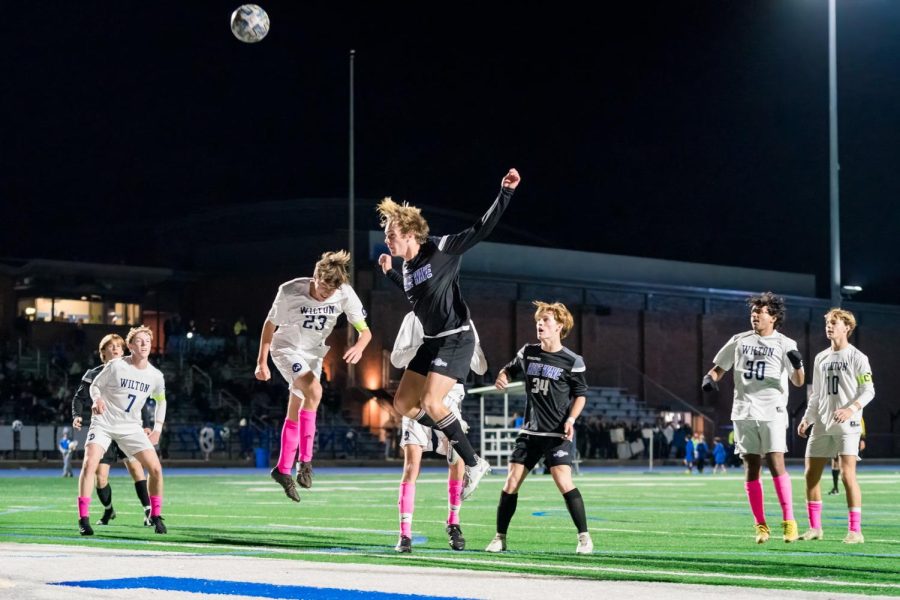Why Athletes Don’t Need P.E.
Student-athletes Should Be Exempt From P.E. Requirement
Student athletes work hard and play hard. With the Connecticut State Board of Education adding more academics to graduation requirements, it is time to rethink the physical education requirement for those students who play a sport.
November 30, 2022
I play sports year-round and spend at least of 12 hours a week (all of this being outside of school) training for races and games. I dread going to gym class. While it can be a nice break to unwind with some friends, it usually results in us walking laps around the track. All that time I can’t help but think of the tasks I could be checking off my to-do list in the library. Last week, after we had already walked a mile on the track, my friends and I stood at the edge of the turf, hoping nobody would notice. That was not the case. A gym teacher from another class spotted us and yelled “stop standing around and get your pulses going”. I did a double-take. Not only was it humiliating but I couldn’t think how ironic it was. Within the three of us, there was a rower, swimmer, and runner who all played at the varsity level. Shouldn’t that be more than enough exercise?
Of course, it is.
In hindsight, this teacher was only doing their job. But this leads me here, writing this article because things need to change at Darien High School.

Students at DHS are required by law to take one credit of physical education in order to graduate. At DHS this looks like .25 credits per year. To keep the record straight, this is different than the “1.0 credit of Health & Safety,” according to Ms. Megan Emanuelson, the Director of Guidance. While it is necessary for all students to take a health class to learn the wellness fundamentals that are not taught in other classes, gym class is redundant for student-athletes.
DHS is ranked # 2 for athletics in all of Connecticut according to Niche.com. Shouldn’t the athletes that devote countless hours each week be given a little leeway when it comes to gym? Additionally, many athletes balance sports and academics as they work towards spots at prestigious universities. Gym class only serves as a burden in reaching this goal.
I wanted to better understand how the school deals with this state requirement. I spoke with Assistant Principal Mr. Mark Mazzone to get an insight on P.E. at DHS. I prioritized my question at the heart of my argument: “Do you agree or disagree with this statement: high school athletes do not need to participate in gym class.” Even after saying he agreed with both sides, it was clear he was in favor of gym class. He went on to give what he said was “a really bad analogy”. If a student is in a history club after school, that doesn’t mean that they are learning everything they would in a history class. He applied this same logic to gym class, where if a person played field hockey in the fall and did not do gym class, they would miss out on all the other sports that the high school has to offer.
I thought about what he said. But at the same time, how important is it that we know how to play frisbee golf? Mr. Mazzone seemed very passionate about the P.E. curriculum at DHS, making it hard for me to imagine it changing. At the same time, after speaking with many teachers and coaches at DHS, the number one reason why we take gym is because of the law, not because of how we might benefit from the course.

Mr. Chris Manfredonia, the Athletic Director at DHS, believed gym class is important because the students who didn’t play sports would be “segregated”, Mr. Manfredonia said.
It is unrealistic to get rid of gym altogether, and even reducing the number of times athletes are required to go per rotation “would not be possible” to still meet the state requirement said Ms. Emanuelson. To me, this is an issue that stretches farther than the realms of DHS. As the state requirements eat up more and more time each year, maybe it’s time to address the lawmakers.
I am not alone when I say that P.E. class is redundant. I spoke to two varsity athletes who will continue to play sports at D1 universities to talk about their experiences in P.E. class.
Last spring I talked to senior Mairead Clas (class of ’22), who is continuing her cross-country and track career at Cornell University. I asked her to walk me through a typical day juggling school, track, and life outside of these two.
It became apparent that finding time to do much of anything after school and track is very difficult. Even with the occasional free periods, Clas said, “The time at school is never enough to get my work done. I get home late after school and have to stay up late to get all my work done. Then I’m tired the next day and it makes running even harder.” Many other athletes that I talked to said that balancing honors and AP-level classes on top of sports is like “a full-time job”.

One thing that Clas stressed was that for everyone in the class, even the non-athletes, gym is a waste of time. The other day in my gym class, it was downpouring and all the gym classes had to stay inside. There is not unlimited gym space so we were left with the weight room. I would say three quarters of the class (myself included) were sitting on stationary bikes scrolling on our phones waiting for class to be over. It is frustrating because I knew that I could be getting a lot of work done if I was allowed to leave and go to the library.
There are certain things that the administration does not have control over, one of those being gym credits. But this law should not be “one size fits all”. Student-athletes should be exempt from at least one of the four gym classes in an eight-day rotation. That is an extra 40 minutes a week to study, meet with teachers, or take a deep breath.
This may seem like a big ask, but it will have large ramifications for many student-athletes.








